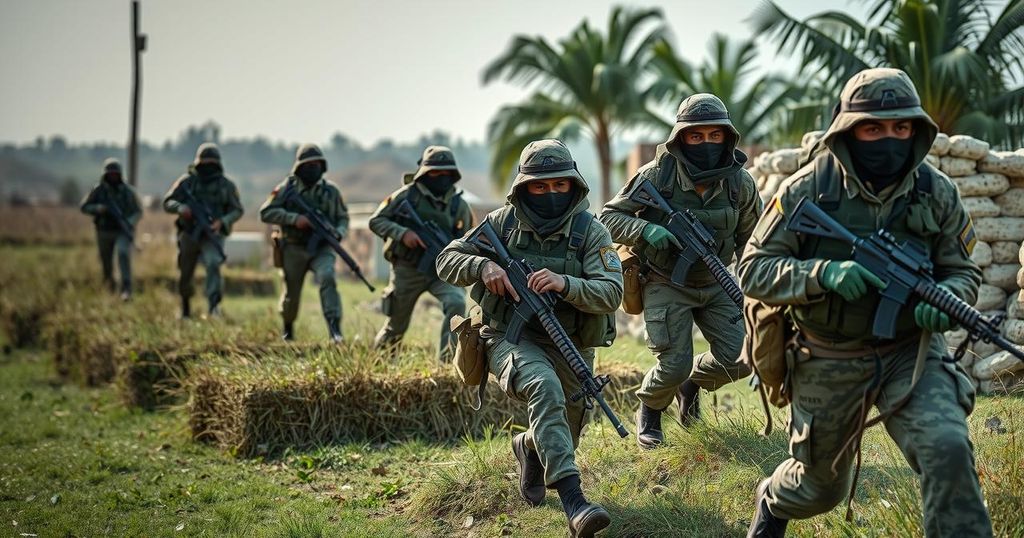The M23 conflict in eastern DRC intensifies as rebel leader Bertrand Bisimwa describes their fight as an ‘existential war’ for Congolese Tutsis’ protection. Armed clashes with the DRC army have led to significant casualties and displacement. Accusations of Rwandan support for M23 complicate peace efforts, while M23 calls for dialogue and governance in the region.
The conflict involving the M23 rebel group in eastern Democratic Republic of Congo (DRC) continues to escalate. Bertrand Bisimwa, head of M23’s political wing, describes the group’s actions as an “existential war” to safeguard Congolese Tutsis, whom he claims have suffered discrimination due to their ethnic affiliation with Rwanda. The ongoing armed conflict, which has intensified over the past three years, has claimed numerous lives and displaced approximately two million individuals.
Originally created in 2012 following a mutiny in the Congolese army, M23 faced initial defeat but resumed hostilities in 2022. Since then, the group has managed to seize significant territories in North Kivu, arguing that its mission is to defend the rights and safety of minority Congolese Tutsis. Bisimwa defended this viewpoint, emphasizing, “We are waging a defensive war to protect these citizens… They are not second-class citizens. The state must take care of them.”
Despite the DRC government viewing M23 as a primary security threat, tensions have soared amid international accusations, notably from the United Nations, claiming that Rwanda supports the rebels militarily—an assertion the Rwandan government denies. Efforts to mediate peace, including the Nairobi process in 2022 and Angola-led initiatives, have been largely unsuccessful, with recent advances by M23 complicating the situation further.
Bisimwa contended that M23’s military actions are reactions to governmental offensives, stating, “We cannot be blamed for defending ourselves… The logic of war dictates that when you have supremacy, you take the space from which they were shooting at you.” The UN has criticized the rebel group’s territorial expansion, to which Bisimwa responded by asserting that M23 is dedicated to the protection of its territory and the resettlement of displaced families, with a reported 480,000 people returning home.
Dialogue remains a contentious topic, as the DRC government has categorically refused to negotiate with M23, labeling them as a proxy for Rwanda. Bisimwa criticized the government’s refusal to engage in dialogue, asserting, “War cannot solve our problems. Dialogue alone can address the root causes of the conflict.” The group faces allegations of collaborating with armed factions like the Allied Democratic Forces (ADF) and of exploiting local mineral resources, which Bisimwa firmly denies, stressing that M23 prioritizes governance and the welfare of local communities.
Bisimwa also highlighted the group’s efforts in securing Virunga National Park, emphasizing its commitment to promoting wildlife conservation by eliminating illegal activities. Despite the ongoing violence, M23 continues to express its desire for a peaceful resolution through dialogue, challenging the Kinshasa government by stating, “If Kinshasa cannot solve our problems, it should let us solve them ourselves.”
The M23 rebel group emerged in the Democratic Republic of Congo as a response to longstanding ethnic tensions and grievances faced by Congolese Tutsis. Formed after a mutiny in the Congolese army, M23 initially struggled but revitalized its efforts in 2022, amidst accusations of foreign intervention, particularly from Rwanda. The ongoing conflict not only poses severe humanitarian challenges, resulting in widespread displacement and casualties, but also reflects deeper issues concerning ethnic identities and governance in the region.
The M23 conflict underscores the complexities of ethnic tensions and governance in eastern DRC. While the group positions itself as a defender of minority rights, accusations of foreign support and collaboration with other armed factions complicate its narrative. The insistence on dialogue for resolution highlights the challenges in addressing the root causes of this protracted conflict. As the situation evolves, the need for concerted international efforts to foster peace and stability becomes increasingly urgent.
Original Source: eastleighvoice.co.ke






